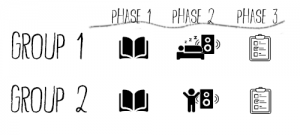Learn Spanish while you sleep
Contents
We all have been there. The night before an exam, you’re stressed and the fear of failing the test becomes a drill in your head. And we all think, “Wouldn’t it be nice to go to bed and just click play and learn the whole syllabus overnight?”
Well, first things first, you can’t learn in one night what should take months to memorize. That’s common sense, isn’t it? I understand that that’s bad news for all of you out there who are a pathological procrastinator.

The idea that you can learn complete new information while sleeping has been debunked over and over in the last years. The first studies about sleeping learning took place in 1955 and, since then almost all of them have shown that it doesn’t work when it comes to learning new information. But sleeping learning can help you to reinforce the information you already have in your brain and that’s really important when it comes to remembering language features like vocabulary.
So let’s talk about the 7 keys to learn Spanish while you sleep.
The sleep study and the sleep cycle
To understand why you can’t learn a whole new language while sleeping is important to know how the sleep cycle works. I know! This is kind of Neuroanatomy and some of you are not compatible with science and all that stuff but I promise I’ll make it simple and clear🤗.
There are two main stages that your body goes through every time you go to bed. REM (which stands for Rapid Eye Movement) and NonRem which is divided into 4 stages. The REM stage is where you dream and where your brain decodes the things you have learned, lived and experienced through the day. The four stages of NonRem sleep have each a specific purpose and I’m not going to explain to them because that would be too much.
So, when you fall asleep, your brain is gonna go through Stage 1, then Stage 2, then Stage 3, Then stage 4 and then REM. That’s what we call a Sleep Cycle. That cycle lasts around one hour and a half. Once the cycle is completed, it starts again getting lighter over the night.

That means that we all have around 4 dreams per night because those are the dream-cycles that fit into an 8-hours sleep. The reason why you sometimes remember just one dream is because you woke up during the REM phase so you remember that last dream that your brain was creating.
As I already told you, on that same REM stage is where your brain decodes the important information stored from the day. It does not take new information, but it remembers the one that is already in your brain. This is important and I’ll come to this latter when I tell you how to improve the language you are currently learning.
How subliminal Spanish learning really works
Let’s assume that we can actually learn while sleeping. Imagine that you get a CD in Spanish that repeats “Juan es un hombre grande y fuerte” and you hear it over and over every night. According to this hypothetical situation, it makes sense that you could use that sentence in the future because you have learned it.
But, here’s the question. Do you think you would be able to understand what that sentence means? Do you think you’d be able to use the adjective “fuerte” if you want to say that the coffee has a strong flavor (“un sabor fuerte”)? Obviously, NO! Even if we imagine a parallel universe where we can actually learn while we sleep, that learning would work only for plain information that does not require active thinking.
📌 It might interest you: «How to learn vocabulary words fast and effectively»
If you wanted to use “fuerte” as an adjective for the coffee, then you should know that “fuerte” is a measure of strength and it can be applied in non-literal sentences like “este café está fuerte” o “Que fuerte lo que me estás contando”. But you wouldn’t know all that. The only thing you have been hearing through the night is “Juan es un hombre grande y fuerte”. So unless you know a guy called Juan who’s quite big and strong, you are not going to use that exact sentence at all.

And that is explained by the fact that learning is a multidisciplinary activity. There’s listening, speaking, writing, grammar, fluency, vocabulary, pronunciation, slang… there are so many different kinds of mental processes involved that the idea that anyone can learn a whole new language while sleeping is completely absurd😪.
«Sleep learning Spanish» is not about learning but recalling
So now that you know how the sleeping cycle works and how the mental processes for learning work, it is easy to understand that it is impossible to learn complete new information while sleeping. But Instead, we can recall what we have learned during the day.
This means that, for example, if you have learned the word “Manzana” 🍎 today in your Spanish class, you can use sleeping learning to make it stick in your head so it will be available whenever you need to say apple in Spanish.
The «Dutch Words» study
This was shown in a study made by Swiss biopsychologist, Björn Rasch, and his team of scientists from the Swiss National Science Foundation. In this study, they asked 60 German-speaking students to learn some Dutch words that they had never seen before.
Half of the group were then allowed to go to sleep and the words were played back to them while sleeping. The other half of the group also got to listen to the words again but they were kept awake.

After several hours both groups were tested about the Dutch words. The results showed that those who had listened to the Dutch words while sleeping were much better at recalling them during the test.
The study also considered the fact that those who were kept awake didn’t perform as well simply because they were sleep-deprived; so the study was made again using EEG measurements (that is electroencephalographic) of the sleeping students and revealed increased activity in the parietal lobe. Since this part of the brain is important in processing language, those who got to sleep had an empirical advantage to learn the new words.
The study concluded:
“This acquired behavior persisted throughout the night and into ensuing wake, without later awareness of the learning process. Thus, humans learned new information during sleep”
So what does this exactly means? This study shows that if you listen to new information before bedtime, and then again as you sleep, this added stimulus strengthens the consolidation process that occurs. So you can make sure that whatever you are learning, it’s gonna stick in your head and it’s less likely for you to forget it.
The Mozart Effect and the Sleeping Language Learning
The concept of the «Mozart effect» was described by French researcher Alfred Tomatis in his 1991 book Pourquoi Mozart? (Why Mozart?). He believed that listening to Mozart’s music promoted healing and the development of the brain.
This book did not present any scientifical proof on the Mozart theory, so in 1993 some researchers investigated the effect of listening to music by Mozart and the results were published in the magazine Nature. They split the participants into three groups and all three completed the same exact test. The first one would listen to Sonata for Two Pianos in D major by Mozart while doing the test. The second one would follow some verbal relaxation instructions and the third one would remain in silence.
They found a temporary enhancement of the mental abilities on the group that listened to Mozart. BUT, it was only temporary: no student had effects extending beyond the 15-minute period in which they were tested.

In 2007 a publication made by the German Government review the scientific literature regarding the Mozart Effect and they concluded that listening to Mozart (or any other kind of music) does not make anyone smarter.
Some years later, in 2010, some psychologists from the University of Vienna reviewed over 40 studies that measured the Mozart Effect and the conclusion was clear: The mental improvement shown by the Mozart Effect could not be replicated and it is impossible to affirm that external stimulus could affect learning abilities.
This proves that magical solutions do not exist. If you want to learn Spanish while you sleep you have to do things right and forget all these marvelous simple solutions that promise to make you smarter with no effort. Got it? Let’s continue.
“Repetitio mater studiorum est” (or «how to repeat over and over Spanish while sleeping»)
«Repetitio mater studiorum est» is Latin and means «Repetition is the mother of learning«. There is no doubt that memorizing anything to make it stick in the long term memory is all about repeating the information you want to learn. But repetition can be an active process or a passive process.
Let me explain: when you are learning how to ride a bike, and you try and try and try, that’s an active process. You are focused on that matter and your attention in nowhere else but on riding the bike. But when you learned that «Siesta» meant a nap, that «Olé!» is an expression of joy, and «Fiesta» meant Party, that was a passive process. You never sat down and tried to memorize those words, did you? 🤓
📌 It might interest you: «How to get a Spanish Tutor (almost) for free»
Yes, you can learn from those two kinds of repetition but only one is really effective in the long term. Guess which one! Active repetition is the key to success when you try to learn something new. Passive repetition is good when it comes to surprising new facts that either shock you or make you laugh. For example “Fiesta”. You heard that word many times passively and it was just funny enough for it to be remembered. But the bad news is that most of the vocabulary in any language is not funny. So you have to actively repeat it and learn it if you want to learn Spanish while you sleep.

When it comes to sleeping learning, you can listen several times to the exact same CD and you’ll only learn those exact words that are mentioned in the CD. You have to understand this: Language learning is an active process, not a passive one.
The power-nap will boost your Spanish while you sleep
You already know how learning works and how the sleeping cycle works. We have discussed that it is on the REM stage where our brain decodes whatever it has learned during the day. And we go through several REM stages during the night. So, what about if we use that information to learn faster?
Imagine that you are trying to learn something in… let’s say Russian, and right after you have been practicing it, you take a nap. Just a quick-short nap that lasts one sleep cycle, so you can get into the REM stage and reinforce that exact thing you have been trying to remember. Would it work?
¡YES, IT WOULD WORK!
In fact, one particular study around word learning and napping showed that children who were encouraged to sleep shortly after hearing new words retained their newly acquired knowledge significantly better than other children who remained awake. This study pointed out that the evidence for the effect of sleep on declarative and implicit memory in infants and children is mounting and, in particular, the influence of sleep on word learning.
Both napping and overnight sleep appear to strengthen children’s memory for novel words. Regular exposure to novel words coupled with regular sleep phases is likely to contribute to their integration of novel words into children’s lexicons.
So, you can use the power of naps to help improve your language and learn Spanish while you sleep.

And now, with all this information it’s time to show you how to really improve a new language while sleeping. summarizing all written above:
Can you learn Spanish while sleeping?
YES and NO! At this point you already know that:
- You can’t learn complete new information, so you have to use sleeping learning ONLY with the information you already have stored in your brain.
- Remember that sleeping learning is a passive process so it will only work for simple memorization processes like vocabulary or pronunciation. You won’t learn any grammar, fluency, slang, composition, etc…
How to learn Spanish in your sleep
So, what do you do to improve faster on your language learning? First, you have to ACTIVELY learn the words before. Spend around 20 to 40 minutes learning the words, using them in sentences and looking for the many meanings it could have. Then, record an audio of yourself speaking out the words.
You can say them only on the language you are trying to learn or you can say them in both languages, your native one and the one you want to learn. So if you want to learn the capitals in Italian, for example, you can record yourself repeating “Londra, Parici, Roma…” or you can repeat “Londra, London, Parici, Paris, Roma, Rome…” and so on.
📌 It might interest you: «Free resources to learn spanish that you HAVE to know»
You can focus on just one word for a while and then change to another one, or mix them up. Like “Londra, Londra, Londra” vs “Londra, Parici, Roma…”. It doesn’t matter how many times you say them and in which order. What matters is that you avoid any other stimulus.
What you should NOT do when using sleeping learning
🚫 It is forbidden to play background music, sounds, long phrases, and this kind of things. If our goal is to learn the capitals, why the hell you want to record yourself saying “The capital of France in Italian is Parici”?. That’s too much for your unconscious brain. Just stick to the words. That’s where most of the material that you can find on the Internet fails. They have these super-elaborated audios with sounds, and effects, and well-designed sentences. Avoid all that. Focus on what you want to remember.
Useful tips to learn Spanish while sleeping
The sooner you go to bed after learning the words, the better it is gonna work. So try to work on that vocabulary the closest to bedtime as possible. Then, play the audio and go to sleep.
There’s no point in having the audio playing the whole night. Your brain will only be getting that external stimulus on the first stages of sleep so the best period for sleep learning is until 30 to 40 minutes after getting asleep. After that, nothing will reach your brain so it will be worthless. The best option is to prepare 1-hour long audios. That way you will be sure you’ll be covering your first stages of sleep even if it takes a while for you to get really asleep.
Remember to hear the same audio for several days. 4 to 5 days would be the best option. If you change the words every night won’t do that much. I usually hear the same CD for one week.
Last words
If you do this correctly, you will start noticing that those words are easier to recall on your daily use of the language. Remember this is not a trick to learn a whole new language in 30 days. Learning Spanish, or Italian, or Russian or whatever will require hard work. But you can learn it quicker using this technique😉. Now you know how you can learn Spanish while you sleep.
Was this information useful for you? Have you ever tried sleeping learning before? Leave your thoughts on the comments section.
That’s all for now. See you soon. Ciao Pandas.


Hola, el enlace a https://www.polyglotpanda.com/private-tutoring/ está roto.
Hola Cinzia,
Gracias por tu aviso!
Ya he corregido el enlace en este post y ahora ya no está roto 🙂
Un abrazo